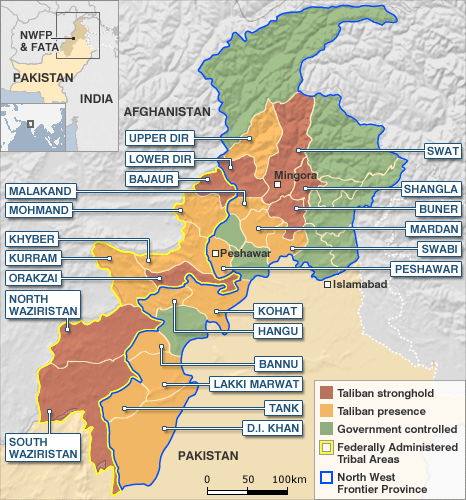Pakistani Prime Minister Yousuf Raza Gilani has announced the end of the Pakistani military campaign in South Waziristan, although he seems to reserve the possibility that it might nevertheless continue. The reason for the ambiguity is surely that South Waziristan is a huge place, and that many fighters of the Taliban movement of Pakistan melted away before the advance of the conventional Pakistani army. Thus, South Waziristan is unlikely actually to have been decisively pacified with this short campaign. Some of the escaped insurgents are likely now on the Afghanistan side of the border and are now a headache for the United States and NATO. Indeed, PM Gilani is petrified that the Obama surge will send thousands of angry Pashtuns back over the border into Pakistan.
Gilani also indicated that the next big military campaign against the Pakistani Taliban would focus on the Orakzai Tribal Agency. It lies athwart the route to the Khyber pass and is a convenient staging ground for attacks by the Pakistani Taliban on Peshawar and on NATO convoys and warehouses in the Peshawar area, which provision US and NATO troops in Afghanistan. Orakzai is dominated by the Taliban of Hakeemullah Mehsud [PDF], the successor to Baitullah Mehsud, and has been put under typical rigid religious rule. One of the targets in South Waziristan had also been Taliban insurgents from the Mehsud tribe. An Orakzai campaign does have some benefit for the US and NATO if it contributes to the safety of NATO convoys heading for the Khyber Pass. But neither South Waziristan nor Orakzai is central to the insurgency on the Afghanistan side of the Durand Line, and so Pakistani military intervention in those two places concentrates on threats to Islamabad. Many observers feel that an attack on North Waziristan, the stronghold of the Haqqani Network and al Qaeda allies, would be far more consequential for President Obama’s war effort insofar as attacks are launched by these groups deep into Afghanistan from North Waziristan. That Orakzai might be the next target suggests a continuing preoccupation in Islamabad with perceived threats to Pakistan proper rather than a determination to take on frontally the groups most dangerous to the Karzai government in Kabul.
Gilani went on to talk about reconciliation with dissident Baluch tribes, whose own insurgency is characterized by a form of subnationalism and tribalism rather than Muslim extremism. Baluch activisits point out that the federal government derives far more revenue from the province in the form of natural gas and other commodities than Islamabad returns to it in the form of services. Again, Gilani is addressing a Pakistani internal matter. US officials see the Baluchistan capital of Quetta as a continuing headquarters for Mullah Omar and the Old Taliban; they see it as indeed the center of the Quetta Shura, which plans out attacks inside Afghanistan. That Gilani is preoccupied with settling Islamabad’s feud with the secessionist Bugti tribe rather than focusing on Mullah Omar and Quetta again demonstrates that the Obama administration still faces hurdles in attaining complete cooperation from the Pakistani government in the Afghanistan war effort.
End/ (Not Continued)




 © 2026 All Rights Reserved
© 2026 All Rights Reserved